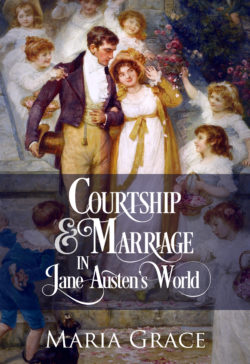Conduct during Courtships in Jane Austen’s World
Nothing, especially courtships were straightforward in Jane Austen’s World.
 Squelching, not encouraging courtship
Squelching, not encouraging courtship
Many of the rules governing conduct in courtship helped squelch the possibilities of romantic passion. These included forbidding the use of Christian names, paying compliments, driving in carriages alone together, correspondence, and any kind of intimate contact.
If a couple was observed violating any of them, onlookers would immediately assume a proposal had been offered and accepted. Even mild displays of friendliness could inspire speculations about a possible offer of marriage. Thus, in Sense and Sensibility, many assumed Marianne and Willoughby were engaged because of their very open affectionate behavior. No wonder everyone was so scandalized!
Compromised!
A mistaken assumption of betrothal could be very dangerous to a woman’s reputation. Betrothed couples often engaged in sexual behaviors. If a woman was assumed engaged then found not to be, many would assume she had compromised her virtue and her reputation might be ruined. (This was the crux of the favorite romance novel plot point, a young woman being ‘compromised’) An honorable man might make her an offer of marriage at that point to preserve her reputation.
In Sense and Sensibility, Willoughby brings Marianne to tour Allenham without a chaperone, effectively telling her he expects her to be mistress of the estate eventually. The same action also compromises her. Running off with Wickham, compromised Lydia’s reputation in Pride and Prejudice. That neither man was eager to marry the lady they compromised reveals much about their character.
Chaperones
Young, unmarried women were never alone in the company of a gentleman (save family and close family friends) or at any social event, without a chaperone. Who knew what kind of ideas she or he could get!
Except for a walk to church or a park in the early morning, a lady could not even walk without an appropriate companion. (Of course a potential suitor would not be appropriate!) Though a lady might drive her own carriage or ride horseback, if she left the family estate, a groom must attend her.
In Emma, we see the ‘close friend or family’ clause invoked. Mr. Knightley has been a family friend for at least a decade. He and Emma are allowed liberties to walk and talk and keep company together because of the closeness of their connections. In Mansfield Park, Edmund is also permitted the same liberties with Fanny Price for the same reasons. She is family and not considered a marriageable partner in any case because of her low status (being a cousin did not disqualify her from being an eligible match.) Edward shares unchaperoned moments with Elinor in Sense and Sensibility because his is considered a family connection through his sister, their half-brother’s wife.
In contrast, in Pride and Prejudice, Elizabeth walking in the woods at Rosings Park with Mr. Darcy, or Col. Fitzwilliam, —with whom she has no such connections—is highly improper.
Touching
Naturally, all forms of touching were kept to a minimum. Sakes alive, what kind of unrestrained behavior might that lead to?
Putting a lady’s shawl about her shoulders, or assisting her to mount a horse, enter a carriage or climb stairs were acceptable. A gentleman might take a lady’s arm through his, to support her while out walking.
However, he must never try to take her hand, even to shake it friendly-like. If he did, she must immediately withdraw it with a strong air of disapproval, whether she felt it or not. When Marianne tried to shake Willoughby’s hand in public in Sense and Sensibility it was really quite forward and even shocking public behavior.
Conversation
Conversations had to be extremely discreet, leaving much to be interpreted from facial expressions alone. Even smiles and laughs were proscribed by many advice writers.
There is another Character not quite so criminal, yet not less ridiculous; which is, that of a good humour’d Woman, one who thinketh she must always be in a Laugh, or a broad Smile, because Good-Humour is an obliging Quality… (The Whole Duty of a Woman, 1737)
Mr. Elton’s riddle about courtship in Emma is a good example of the kind of roundabout, overtly subtle conversation that could come about because of these rules.
And we all know how well that turned out for him.
Want to learn more? Try Courtship and Marriage in Jane Austen’s World, available in ebook and paperback
.
Please support this author and website by using this affiliate link.
References
A Lady of Distinction – Regency Etiquette, the Mirror of Graces (1811). R.L. Shep Publications (1997)
A Master-Key to the Rich Ladies Treasury or The Widower and Batchelor’s Directory by a Younger Brother, published in 1742.
Day, Malcom – Voices from the World of Jane Austen. David & Charles (2006)
Gener, S., and John Muckersy. M. Gener, Or, A Selection of Letters on Life and Manners. 3rd ed. Edinburgh: Printed for Peter Hill …, A. Constable & and A. MacKay ;, 1812.
Jones, Hazel – Jane Austen & Marriage . Continuum Books (2009)
Lane, Maggie – Jane Austen’s World. Carlton Books (2005)
Laudermilk, Sharon & Hamlin, Teresa L. – The Regency Companion. Garland Publishing (1989)
Le Faye, Deirdre – Jane Austen: The World of Her Novels. Harry N. Abrams (2002)
Ray, Joan Klingel – Jane Austen for Dummies. Wiley Publishing, Inc. (2006)
Ross, Josephine – Jane Austen’s Guide to Good Manners. Bloomsbury USA (2006)
Selwyn, David – Jane Austen & Leisure. The Hambledon Press (1999)
Vickery, Amanda – The Gentleman’s Daughter. Yale University Press (1998)


Comments
Conduct during Courtships in Jane Austen’s World — No Comments
HTML tags allowed in your comment: <a href="" title=""> <abbr title=""> <acronym title=""> <b> <blockquote cite=""> <cite> <code> <del datetime=""> <em> <i> <q cite=""> <s> <strike> <strong>